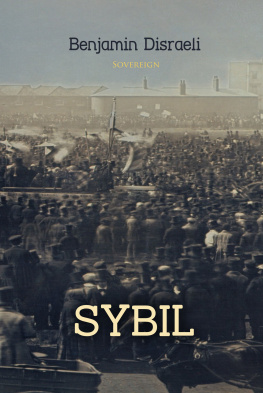
Benjamin Disraeli
Coningsby

The New Generation




LONDON NEW YORK TORONTO SAO PAULO MOSCOW
PARIS MADRID BERLIN ROME MEXICO CITY MUMBAI SEOUL DOHA
TOKYO SYDNEY CAPE TOWN AUCKLAND BEIJING
New Edition
Published by Sovereign Classic
This Edition
First published in 2018
Copyright 2018 Sovereign Classic
All rights reserved.
ISBN: 9781787248960
Contents
BOOK I.
CHAPTER I.
It was a bright May morning some twelve years ago, when a youth of still tender age, for he had certainly not entered his teens by more than two years, was ushered into the waiting-room of a house in the vicinity of St. Jamess Square, which, though with the general appearance of a private residence, and that too of no very ambitious character, exhibited at this period symptoms of being occupied for some public purpose.
The house-door was constantly open, and frequent guests even at this early hour crossed the threshold. The hall-table was covered with sealed letters; and the hall-porter inscribed in a book the name of every individual who entered.
The young gentleman we have mentioned found himself in a room which offered few resources for his amusement. A large table amply covered with writing materials, and a few chairs, were its sole furniture, except the grey drugget that covered the floor, and a muddy mezzotinto of the Duke of Wellington that adorned its cold walls. There was not even a newspaper; and the only books were the Court Guide and the London Directory. For some time he remained with patient endurance planted against the wall, with his feet resting on the rail of his chair; but at length in his shifting posture he gave evidence of his restlessness, rose from his seat, looked out of the window into a small side court of the house surrounded with dead walls, paced the room, took up the Court Guide, changed it for the London Directory, then wrote his name over several sheets of foolscap paper, drew various landscapes and faces of his friends; and then, splitting up a pen or two, delivered himself of a yawn which seemed the climax of his weariness.
And yet the youths appearance did not betoken a character that, if the opportunity had offered, could not have found amusement and even instruction. His countenance, radiant with health and the lustre of innocence, was at the same time thoughtful and resolute. The expression of his deep blue eyes was serious. Without extreme regularity of features, the face was one that would never have passed unobserved. His short upper lip indicated a good breed; and his chestnut curls clustered over his open brow, while his shirt-collar thrown over his shoulders was unrestrained by handkerchief or ribbon. Add to this, a limber and graceful figure, which the jacket of his boyish dress exhibited to great advantage.
Just as the youth, mounted on a chair, was adjusting the portrait of the Duke, which he had observed to be awry, the gentleman for whom he had been all this time waiting entered the room.
Floreat Etona! hastily exclaimed the gentleman, in a sharp voice; you are setting the Duke to rights. I have left you a long time a prisoner; but I found them so busy here, that I made my escape with some difficulty.
He who uttered these words was a man of middle size and age, originally in all probability of a spare habit, but now a little inclined to corpulency. Baldness, perhaps, contributed to the spiritual expression of a brow, which was, however, essentially intellectual, and gave some character of openness to a countenance which, though not ill-favoured, was unhappily stamped by a sinister cast that was not to be mistaken. His manner was easy, but rather audacious than well-bred. Indeed, while a visage which might otherwise be described as handsome was spoilt by a dishonest glance, so a demeanour that was by no means deficient in self-possession and facility, was tainted by an innate vulgarity, which in the long run, though seldom, yet surely developed itself.
The youth had jumped off his chair on the entrance of the gentleman, and then taking up his hat, said:
Shall we go to grandpapa now, sir?
By all means, my dear boy, said the gentleman, putting his arm within that of the youth; and they were just on the point of leaving the waiting-room, when the door was suddenly thrown open, and two individuals, in a state of great excitement, rushed into the apartment.
Rigby! Rigby! they both exclaimed at the same moment. By G theyre out!
Who told you?
The best authority; one of themselves.
Who? who?
Paul Evelyn; I met him as I passed Brookes, and he told me that Lord Grey had resigned, and the King had accepted his resignation.
But Mr. Rigby, who, though very fond of news, and much interested in the present, was extremely jealous of any one giving him information, was sceptical. He declared that Paul Evelyn was always wrong; that it was morally impossible that Paul Evelyn ever could be right; that he knew, from the highest authority, that Lord Grey had been twice yesterday with the King; that on the last visit nothing was settled; that if he had been at the palace again to-day, he could not have been there before twelve oclock; that it was only now a quarter to one; that Lord Grey would have called his colleagues together on his return; that at least an hour must have elapsed before anything could possibly have transpired. Then he compared and criticised the dates of every rumoured incident of the last twenty-four hours, and nobody was stronger in dates than Mr. Rigby; counted even the number of stairs which the minister had to ascend and descend in his visit to the palace, and the time their mountings and dismountings must have consumed, detail was Mr. Rigbys forte; and finally, what with his dates, his private information, his knowledge of palace localities, his contempt for Paul Evelyn, and his confidence in himself, he succeeded in persuading his downcast and disheartened friends that their comfortable intelligence had not the slightest foundation.
They all left the room together; they were in the hall; the gentlemen who brought the news looked somewhat depressed, but Mr. Rigby gay, even amid the prostration of his party, from the consciousness that he had most critically demolished a piece of political gossip and conveyed a certain degree of mortification to a couple of his companions; when a travelling carriage and four with a ducal coronet drove up to the house. The door was thrown open, the steps dashed down, and a youthful noble sprang from his chariot into the hall.
Good morning, Rigby, said the Duke.
I see your Grace well, I am sure, said Mr. Rigby, with a softened manner.
You have heard the news, gentlemen? the Duke continued.
What news? Yes; no; that is to say, Mr. Rigby thinks
You know, of course, that Lord Lyndhurst is with the King?
It is impossible, said Mr. Rigby.
I dont think I can be mistaken, said the Duke, smiling.
I will show your Grace that it is impossible, said Mr. Rigby, Lord Lyndhurst slept at Wimbledon. Lord Grey could not have seen the King until twelve oclock; it is now five minutes to one. It is impossible, therefore, that any message from the King could have reached Lord Lyndhurst in time for his Lordship to be at the palace at this moment.



















